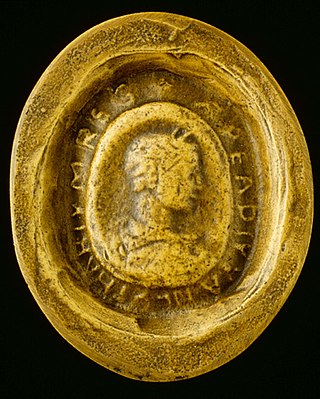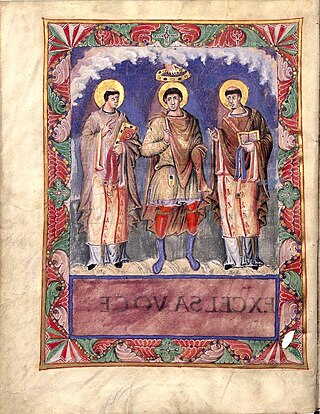Related Research Articles
The 860s decade ran from January 1, 860, to December 31, 869.
Pope Nicholas I, called Nicholas the Great, was the bishop of Rome and ruler of the Papal States from 24 April 858 until his death. He is remembered as a consolidator of papal authority, exerting decisive influence on the historical development of the papacy and its position among the Christian nations of Western Europe. Nicholas I asserted that the pope should have suzerainty over all Christians, even royalty, in matters of faith and morals.

Lothair II was the king of Lotharingia from 855 until his death in 869. He was the second son of Emperor Lothair I and Ermengarde of Tours. He was married to Teutberga, daughter of Boso the Elder.

Louis II, sometimes called the Younger, was the king of Italy and emperor of the Carolingian Empire from 844, co-ruling with his father Lothair I until 855, after which he ruled alone.

Hincmar, archbishop of Reims, was a Frankish jurist and theologian, as well as the friend, advisor and propagandist of Charles the Bald. He belonged to a noble family of northern Francia.
Teutberga was a queen of Lotharingia by marriage to Lothair II. She was a daughter of Bosonid Boso the Elder and sister of Hucbert, the lay-abbot of St. Maurice's Abbey.

Ebbo or Ebo was the Archbishop of Rheims from 816 until 835 and again from 840 to 841. He was born a German serf on the royal demesne of Charlemagne. He was educated at his court and became the librarian and councillor of Louis the Pious, king of Aquitaine, son of Charlemagne. When Louis became emperor, he appointed Ebbo to the see of Rheims, then vacant after the death of Wulfaire.

The Photian Schism was a four-year (863–867) schism between the episcopal sees of Rome and Constantinople. The issue centred on the right of the Byzantine Emperor to depose and appoint a patriarch without approval from the papacy.
Gunther or Gunthar was Archbishop of Cologne in Germany from 850 until he was excommunicated and deposed in 863.
Engelberga was the wife of Emperor Louis II and thus Carolingian empress to his death on 12 August 875. As empress, she exerted a powerful influence over her husband.
Hugh or Hugo was an illegitimate son of Lothair II, king of Lotharingia, by his mistress Waldrada. His father made him Duke of Alsace in 867.
Wilbert was the archbishop of Cologne from 870 until his death.
Bertulf was the Archbishop of Trier from 869 until his death.
Hucbert was a Frank and son of the count Boso the Elder. Therefore, he was a Bosonid, and the namesake for the Huberterian branch of the family. His rise to power commenced under Lothair I but continued under Lothair II, reaching its apex when his sister Theutberga married Lothair II, a prince of the Carolingian dynasty, the imperial family of Francia. Hucbert also served as the lay-abbot of the Abbey of Saint Maurice-in-Valais. This gave him control over the Mons Iovis pass, the main route between Francia and Italy. Hucbert later gained power in the region of Transjurane Burgundy (859) which is what helped him later to find safety within the kingdom of Charles the Bald.
Hincmar, called the Younger, was the Bishop of Laon in the West Frankish Kingdom of Charles the Bald from 858 to 871. His career is remembered by a succession of quarrels with his monarch and his uncle, archbishop Hincmar of Rheims. After initial loyalty to Charles trouble occurred from 868 due to the allocation of benefices on the see's estates. The conflict grew dangerous as it became embroiled in the larger dispute of Lotharingian succession following Lothair II’s attempted divorce from his wife. Hincmar’s struggle against his king provides a Carolingian example of early Medieval clerical exemption.

Odo I was a West Frankish prelate who served as abbot of Corbie in the 850s and as bishop of Beauvais from around 860 until his death in 881. He was a courtier and a diplomat, going on missions to East Francia and the Holy See.
Waldrada was the mistress, and later the wife, of Lothair II of Lotharingia.

Adventius was the Bishop of Metz from 855 until his death in 875. He was a prominent figure within the courts of the Carolingian kings Lothar II (855–869) and Charles the Bald (840–877).
The Council of Metz of 863 was arranged by Pope Nicholas I to discuss the divorce case of Lothar II, king of Lotharingia, and his wife Theutberga. The council was mainly attended by Lothar II's supporters, and thus concluded the divorce case in his favour; this decision was later overruled by Pope Nicholas I who suspected foul play. It was the fourth and final council called during the reign of Lothar II. No documents from the council survive, but as the council was controversial it is discussed in other medieval sources such as the letters of Pope Nicholas I, the Annals of St Bertin, the Annals of Fulda and the Liber Pontificalis.
Eigil, also spelled Eigel, Eogil, Egil, Egilo or Heigil, was the abbot of Prüm from 853 to 860, abbot of Flavigny from 860 to 865 and archbishop of Sens from 865 until his death.
References
- 1 2 Bernwieser, Johannes, "Theutgaud", Neue Deutsche Biographie 26 (2016), S. 142
- ↑ The Annals of Fulda, Volume II, (Timothy Reuter, ed.) Manchester University Press, 1992, p. 40, n.10 ISBN 9780719034589
- ↑ Heidecker, Karl (2010). The Divorce of Lothar II : Christian Marriage and Political Power in the Carolingian World (Conjunctions of Religion & Power in the Medieval Past). Ithaca: Cornell University Press.
- ↑ Nelson 1992, p. 215.
- ↑ Bougard, François. "Engelberga, imperatrice", Treccani. 1993
- ↑ Nelson 1992, p. 223 n. 10.